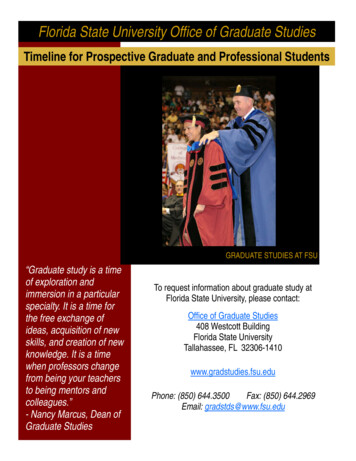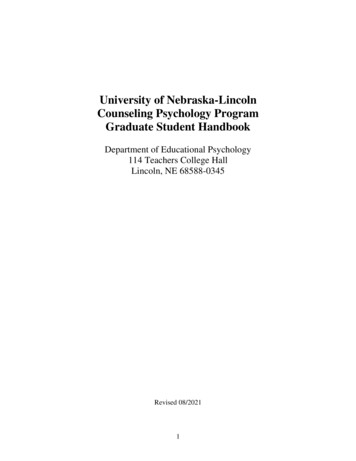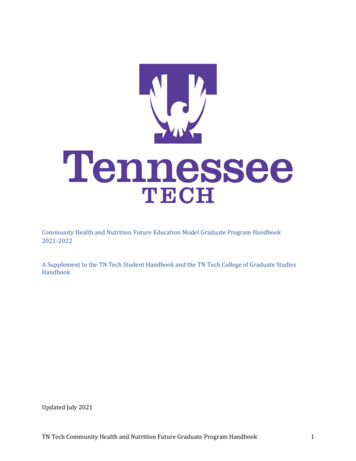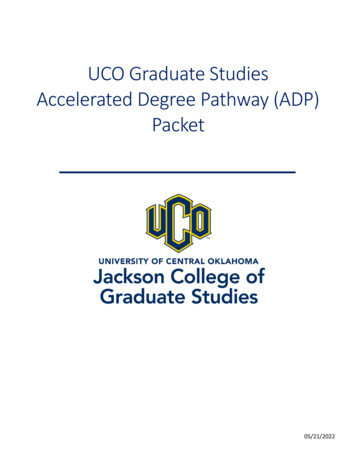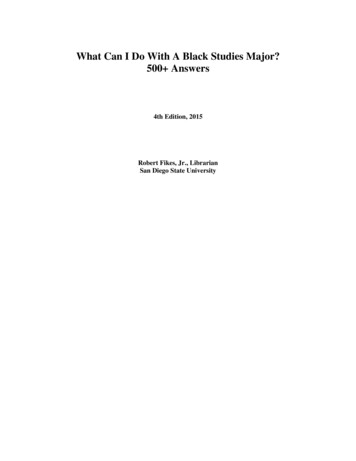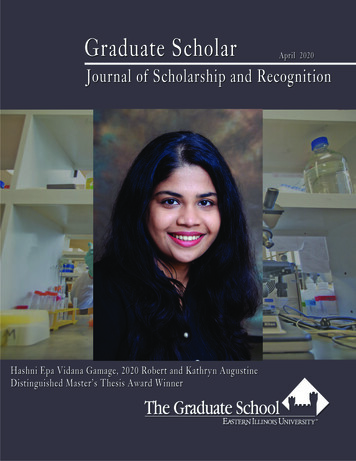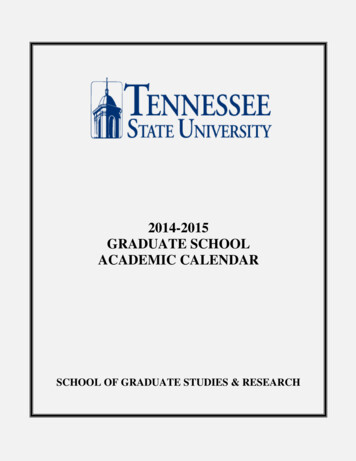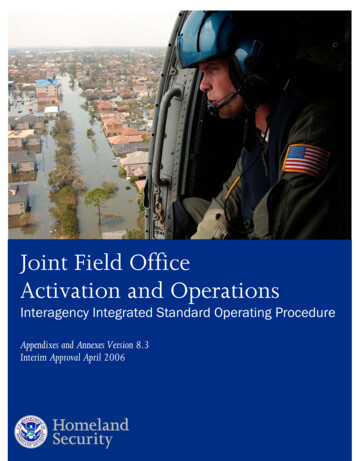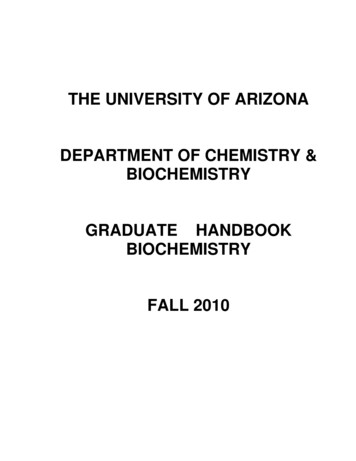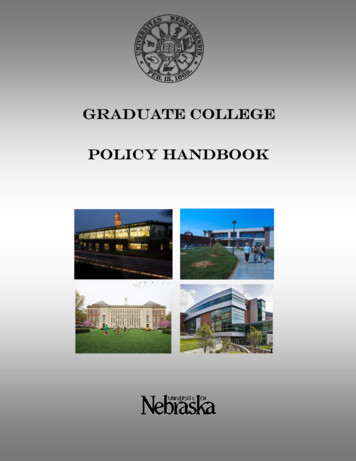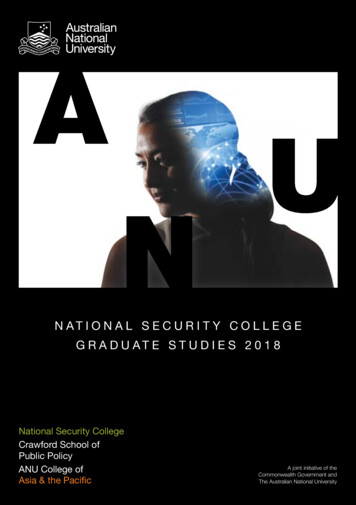
Transcription
N AT I O N A L S E C U R I T Y C O L L E G EG R A D U AT E S T U D I E S 2 0 1 8National Security CollegeCrawford School ofPublic PolicyANU College ofAsia & the PacificA joint initiative of theCommonwealth Government andThe Australian National UniversityThe Australian National Universityi
iiNational Security College
MESSAGE FROMTHE HEAD OF COLLEGEinteractions with leading internationalexperts such as our DistinguishedProfessor Jim Clapper, formerly PresidentObama’s intelligence chief.Amid global uncertainty,there has never been a moreimportant time to studynational security.The National Security College is uniquelypositioned to meet that need. As a jointinitiative of the Australian Governmentand the Australian National University,we are singularly placed at the nexus ofpolicymaking and the advancement ofknowledge.We have a record of cultivating newgenerations of security thinkersand enhancing the credentials andopportunities of students wanting to workin the national security space.We take an innovative and forward-lookingapproach to our teaching and learningmethods, for example through scenarioexercises and exposure to the policy worldthrough guest presenters drawn fromAustralia’s most distinguished nationalsecurity practitioners.Students benefit from our vibrantprogram of policy engagement, careersbriefings from government agencies, andThe academic environment here ismulti-disciplinary, highly interactive andresponsive to the security problems ofa world in change. Our staff are craftinga new hybrid field of knowledge, at theintersection of domestic and internationalsecurity – national security for thechallenges of the 21st century.At the NSC, we strive to understand andaddress the significant national securitypolicy questions that confront Australia,the Indo-Pacific region and the world. Wepride ourselves on approaching theseissues in a way that combines academicrigour with policymaking practicality.We’re especially interested in the securitychallenges that multiple countries face incommon in a world of uncertainty – areaslike cyber, terrorism, propaganda, politicalinterference and other transnationalthreats, plus of course continuingconcerns about geopolitics.As a policy practitioner with an interestin how strategic decisions should beinformed by research and argument, I amprivileged to lead the National SecurityCollege, the premier institution in its field.Professor Rory MedcalfHead, National Security CollegeThe Australian National University1
OUR PROGRAMSAs a student at the NationalSecurity College (NSC), you’llbe joining a supportive andpassionate community ofstudents, alumni and nationalsecurity practitioners.You’ll engage with world-leadingscholars at the cutting edgeof national security research,with the wider national securitycommunity, and with leadersin government, politics,business and NGOs inAustralia and internationally.The Master of National Security Policy hasevolved as a challenging and rewardingprogram of inquiry and contestible learningfor aspiring professionals who want: a comprehensive understanding ofhow national security works both intheory and in practice, in Australiaand internationally a deep understanding of the securityissues facing the Indo-Pacific regionand the world a chance to acquire and contributeto knowledge of tomorrow’s securitychallenges and the opportunitiesmeet them2National Security College an enhanced capacity to lead orcontribute to policy development andsecurity practice in government andrelated sectors access to experts and senior officialsin Australia’s capital, insider views andnetworks of like-minded professionals skills that will prepare you for a careerin government, intelligence, the military,international organisations, civil societyor the private sector, in Australia andthroughout the world.Your careerWhether your career aspirations lie ingovernment, the private sector, internationalorganisations or the media, a degree fromthe NSC can help you achieve them.The NSC’s graduate programs will give youboth a strong theoretical underpinning anda practical understanding of the national,regional and global security challenges thatwill shape the 21st century. You’ll be taughtby leaders in their fields and gain access totop Australian and overseas officials fromgovernment and the private sector.At the National Security College, you’ll bepart of a new generation of professionalsfrom across Australia and around the worldwho are engaging with applied nationalsecurity policymaking in Australia’s capital.You’ll gain an internationally respectedqualification in national security with afocus on the dynamic Indo-Pacific regionand develop the skills and networks you’llneed to further your career.
Master ofNational Security PolicyMaster of National SecurityPolicy (Advanced)CRICOS Code: 082340ACRICOS Code: 082341MProgram Code: 7870 MNSPOProgram Code: 7870 VNSPOUnits/Duration: 96 units / 1 - 2 yearsdependent on previousstudiesUnits/Duration: 96 units/ 1 - 2 yearsdependent on previousstudiesAdmission requirementsAdmission requirements A Bachelor degree or internationalequivalent with a minimum GPA of 5/7 A Bachelor Degree or internationalequivalent with a minimum GPA of 5/7 Applicants with a Bachelor Degreeor Graduate Certificate in a cognatediscipline may be eligible for 24 units(one semester) of credit Applicants with a Graduate Diploma ordegree in a cognate discipline may beeligible for 48 units (one year) of credit Credit may be available for relevantwork experience. Applicants with a Bachelor Degreeor Graduate Certificate in a cognatediscipline may be eligible for 24 units(one semester) of credit Applicants with a Graduate Diploma ordegree in a cognate discipline may beeligible for 48 units (one year) of credit Credit may be available for relevantwork experience.Note: These requirements were correct atthe time of printing. For up to date detailsplease visit the National Security Collegewebsite nsc.anu.edu.auExecutive and professionaldevelopment programsThe NSC also offers executive andprofessional development programs – shortcourses ranging from one day to four weeks– for national security practitioners. We arein the process of introducing academicrecognition for those who have completedNSC short courses. This will allow forexecutive course alumni to transfer their priorlearning into the Master of National SecurityPolicy program from 2018.Students must achieve a minimum 70 percent weighted average mark in the first48 units of courses attempted to remainenrolled in the Master of National SecurityPolicy (Advanced). Students who do notachieve a minimum 70 per cent weightedaverage mark will be transferred to theMaster of National Security Policy.Policy engagementThe NSC has a vibrant policy engagementprogram, making us a trusted think tankin Australia’s national capital. Motivatedstudents have opportunities to connectwith this side of our work, including publicevents and roundtables.The Australian National University3
OUR COURSESCore NSC CoursesNSPO8017Malicious Networks:Transnational Terrorismand CrimeNSPO8018The Evolution of NationalSecurity Policy since 1945NSPO8019Sectarianism and ReligiouslyMotivated ViolenceNSPO8021National Security inthe Indo-PacificStatecraft and NationalSecurity in CyberspaceNSPO8022Writing InternationalRelationsSelected Topic in NationalSecurity PolicyNSPO8024American National SecurityPolicyNSPO8025Terrorism and NationalSecurityNSPO8026Energy and NationalSecurityNSPO8006National SecurityPolicy-makingNSPO8011Foundations ofNational SecurityNSPO8020Research Methodsin National SecurityPolicyNSPO8023INTR8065NSC ElectivesNSPO8008Ethical Challengesfor National SecurityNSPO8009Cyber-intelligenceand SecurityNSPO8010Civil-Military RelationsNSPO8012National Securityand Crisis ManagementNSPO8013Disease, Securityand Biological WeaponsNSPO8014Ethics and Technologiesof War4National Security CollegeResearch componentThe Advanced program requirescompletion of a 24-unit sub-thesis.NSPO8031National Security PolicySub-thesis
STUDENTPROFILEPenny MaherJapan specialist Penny Maherbrims with enthusiasm when shetalks about her move to the nation’scapital to take up the AdvancedMaster of National Security Policy.“I actually love Canberra,” she says.“I’m flourishing in the cold, I lovethe campus life, and I don’t want togo back to Sydney. I’m aconverted Canberran!"Penny’s Bachelor of International Studiesincluded a semester at Tokyo MetropolitanUniversity, for which she was awardedscholarships from both MacquarieUniversity and the Japanese Government.Here she mixed Japanese language,politics and culture with Brazilian JiuJitsu. (“In Japan, it’s more popular thanJapanese Jiu-Jitsu,” she assures us.)She did a stint at the Japan FoundationSydney, where she worked on the journalNew Voices in Japanese Studies andconducted a data analysis of how theJapanese language is studied in Australia.While considering postgraduate optionsone of her tutors, an alumna of theNSC Masters program, told her plainly:“Don’t study security in Sydney – godown to Canberra and get taught by theprofessionals – the people in Sydneyreference the people in Canberra.”Penny is the Equity Officer for the NationalSecurity Students and Alumni Association,where she handles anything from help withjob seeking to serious personal crises. Inher final semester, she is busy shapingthe central question of her research subthesis: What role does demographics playin the Japanese national security debate?“It will be about the ageing population, thede-sexualisaton of the youth, the fallingbirth rate, and the growth in technologiesthat accommodate the loneliness ofpeople,” she says. “It seems to me thatthe Japanese government needs to stoplooking so much at external defenceissues and look inwards to fix theseproblems.”Penny has thrived as a member of theCollege family and feels that the degreehas prepared her well for a career inAustralia’s national security sector:“The lecturers are really approachableand knowledgeable. They are open todiscussing any questions you might raise.They’re very involved, they care about theirstudents and want them to do well.They nurture us and I love it!“My number one choice is the AustralianFederal Police. I don’t mind sitting at adesk, but I’m an active person, so I’d liketo be on the ground, working with people,on operations.“I’m really interested inthe physical protection ofour national security, sowould love to work in anyorganisation that activelyworks to protect the physicalsecurity of Australia.”The Australian National University5
COURSE DESCRIPTIONSNational Security Policymaking(NSPO8006)Cyber-intelligence and Security(NSPO8009)This course will provide you with anin-depth look at Australia’s nationalsecurity policymaking system, includingits structures, processes, actors andnorms. You will look comparatively atnational security policymaking in otherdemocracies, such as the United States,United Kingdom, India, Japan, Indonesiaand France. You’ll learn about practicalaspects of national security policymaking,including strategy and implementation,and will analyse contemporary issuesconcerning the interplay of nationalinterests, values, politics and thebureaucracy. A highlight of this courseeach year is guest lectures by some ofAustralia’s most distinguished nationalsecurity policy leaders and practitioners.In this course, you’ll examine the changingrole of intelligence in the cyber age andthe implications for national securitypolicy. You’ll explore new and emergingsources of intelligence; the new waystraditional intelligence is being mergedwith cyber-intelligence using big datatechnologies; and the role and future ofsecret intelligence in a world awash withopen-source information.Ethical Challenges for NationalSecurity (NSPO8008)As Australia faces challenges rangingfrom domestic terrorism to cybersecurityto climate change, discussions aroundnational security will continue to resonateacross our community, in the media and inpolicymaking. You will examine the ethicalnorms that both underpin and limit nationalsecurity. The course has a particular focuson the way that the relationships betweenthose ethical norms pose challenges fornational security policy and practice.It explores how, and the extent to which,ethical considerations can and shouldinfluence decisions about national security.6National Security CollegeCivil-Military Relations(NSPO8010)This course will help you to develop acritical understanding of the boundariesand complexities of civil-military relationsin disaster and conflict situations. You’llanalyse the policies, principles andpractices of the Australian Government,the United Nations, and other keyinternational actors and non-governmentorganisations. You’ll also examine disasterrisk reduction and peace-buildingstrategies to help minimise the severityof natural disasters and the reversion offragile states into conflict.
Foundations of NationalSecurity (NSPO8011)Disease, Security and BiologicalWeapons (NSPO8013)National security by its nature sits at theintersection of domestic and internationalsecurity challenges. In this comprehensiveintroduction to national security, you’ll firstexamine how key concepts, representedby different and sometime competingworldviews, define and problematisesecurity. You’ll then explore major debatesin the study of national security, as wellas contemporary security challenges forAustralia and other nations.With this course, you will have theopportunity to analyse the political andsecurity significance of infectious diseasesand biological weapons, including thethreat posed by biological weapons;responses to fast-moving diseaseoutbreaks of natural origin; and securityoriented ethics for biological scientists.You’ll develop a critical understanding ofdisease-related security and policy issuesand will be able to formulate, analyse andevaluate security policy options in relationto disease-related security challenges.National Security and CrisisManagement (NSPO8012)This course will provide you with anunderstanding of, and experience in,strategy planning and implementationin the context of national security crisissituations. In particular, you’ll participatein a simulation concerning a hypotheticalnational security crisis where you’ll haveto work collaboratively to producestrategic advice.Ethics and Technologiesof War (NSPO8014)In this course, you will examine the ethicsof the use of force for political purposes,including being introduced to Just Wartheory. You’ll also look at ideas suchas the basic concepts of internationallaw on armed conflict; pre-emptive andpreventive war; humanitarian interventions;and mercenaries and private militarycompanies. You’ll develop a criticalunderstanding of the relationship betweenethics, politics, security and strategy,and will be able to formulate, analyseand evaluate security policy optionsin ethical terms.The Australian National University7
Malicious Networks:Transnational Terrorismand Crime (NSPO8017)This topical course will take you throughthe globalisation and the communicationsrevolution that is empowering transnationalnetworks of terrorists and criminals intheir capacity to threaten national security.You’ll learn about network theory in orderto understand the motivations, operationsand impacts of transnational terrorist andcriminal organisations. You will then go onto analyse the variety of terrorist and crimeorganisations and the responses of variousstates and international bodies to thechallenge of malicious networks.The Evolution of NationalSecurity Policy since 1945(NSPO8018)This course will provide you with anoverview of post-war global securityhistory. You’ll discuss the evolution of theconcept of national security since 1945,examining how and why certain securitythreats and interests were perceived andhow national security policies transformedover time. After completing this course,you’ll have an in-depth knowledge of postwar security challenges and will be ableto critically reflect on key historical andtheoretical viewpoints.8National Security CollegeSectarianism and ReligiouslyMotivated Violence (NSPO8019)In this course, you’ll examine the causesand dynamics of religious and sectarianviolence, as well as the factors thatcause it to spread between societies.You’ll analyse contemporary conflicts –such as those in Iraq, Syria and Egypt– which began with inter-state conflicts orpopular internal uprisings that developedinto sectarian conflicts, and examine thedifferences between them and earlierreligio-nationalist conflicts such asthe Irish Troubles.Research Methods in NationalSecurity Policy (NSPO8020)This important skill-building course willhelp you develop an understandingof different research approaches andmethodologies in preparation for yourown research projects. You’ll learn how toidentify your own research question, selectand identify research approaches andmethods of inquiry, develop argumentsand present your results.Statecraft and National Securityin Cyberspace (NSPO8021)In this highly interdisciplinary course, you’llexamine the evolution of cyberspaceas a domain where states project bothhard and soft power, and how states areadapting to the threats and opportunitiesof this new domain. You’ll analyse how
cyberspace interacts with the traditionaldomains of land, sea, air and spacein which statecraft is prosecuted,and explore the future of cyberspaceand its potential to disrupt ideas ofsovereignty and national security.Selected Topic in NationalSecurity Policy (NSPO8022)This special research-based course allowsyou to learn from visiting specialists atthe National Security College or gainan introduction to research in nationalsecurity. You’ll explore a specific topic indepth through weekly seminar discussionsand extensive research, developingmethods and skills, and leading to adeeper understanding of the topicunder consideration.National Security in theIndo-Pacific (NSPO8023)In this course, you’ll learn about thechallenges and choices facing nationalsecurity policymakers in an era ofincreased connectivity between the AsiaPacific and Indian Ocean regions. This isone of the first academic courses in theworld to explore the emerging concept ofthe Indo-Pacific as a coherent strategicand economic system, along with itsimplications for the security interestsof key regional powers, notably China,India, Japan, Indonesia, the UnitedStates and Australia.American National SecurityPolicy (NSPO8024)Given the predominant role the UnitedStates has played in world affairs sinceWorld War II, American national securitypolicy affects not just Americans, butpeoples and nations around the globe. Inthis course, you’ll develop a systematicunderstanding of the dimensions anddilemmas of American national securitypolicy, with a particular focus on the ideas,institutions and individuals that haveshaped how America frames its approachto national security.Terrorism and National Security(NSPO8025)In this multidisciplinary course, you’llexplore the nature and causes of terrorism,as well as individual (state) and collective(international) responses. You’ll examinethe historical evolution of terrorism, itscauses and rationales, and the majortheoretical and conceptual approaches toits study. You’ll also analyse historical andcontemporary terrorist groups, includingthe recent ‘fourth wave’ of terrorism (e.g.al-Qaeda and ISIS), as well as examiningcounter-terrorism responses and policiesin the context of national securitypolicy formulation.The Australian National University9
Energy and National Security(NSPO8026)Writing International Relations(INTR8065)This course will provide you with a criticalunderstanding of contemporary energysecurity: its contested conceptualisations,relationship to other forms of security andembeddedness within the modern state.It explores these issues by consideringthe inter-relationship between energy andeconomic and societal resilience. You willexplore beyond the traditional ‘consumer’state perspective to the energy-economicnexus of producer states and thegeopolitical strategies of the variousactors involved. The course examines vitalissues such as the globalisation of energysecurity, the rise of non-conventionalenergy sources and the flow-on effectsfor national security policy.This important core course will provideyou with an introduction to graduatewriting skills focused on the disciplineof international relations. It seeks todevelop such skills as: how to read forargument; how to construct an argument;forms of reasoning and evidence;structuring an essay; how to conductadvanced research; and critical thinking.The course does this through a carefulanalysis of selected international relationstexts and debates, and through theinteractive development of graduatedwritten assignments.National Security Policy Subthesis (NSPO8031)The Master of National Security Policy(Advanced) includes a significant researchcomponent – the requirement to completea Sub-thesis – as part of the program.This 12,000-15,000 word project is worth24 units: one quarter of the degree’srequirement, or one semester of full-timestudy. High-performing students are ableto frame their own research topic and arematched with an academic supervisorwho holds expertise in the relevant field.10 National Security College
STUDENTPROFILERohit AlokNew Delhi-born and Mumbairaised journalist Rohit Alok hasnever stopped looking for answers– or asking questions. His questfor deeper understanding hasled him to the National SecurityCollege at ANU.Having experienced the intensity ofcrime and environment reporting forThe Indian Express, Rohit decided toget to the bottom of “how things reallywork.” “I wanted to study somethingsecurity-related because in generalinsecurity is something everyone canrelate to, at a personal, societal andnational level,” he says. “My way ofunderstanding security is by looking atthe sources of human insecurity and thentrying to probe them further.”Rohit determined that the best way to dothis was to both study abroad and stay inthe region in order to focus on the AsiaPacific. “I feel if you study where you arefrom, it would be hard to ask questions” hesays. “It is critical to get a neutral view onhow things are – you need to step out ofthe box. I chose the NSC at ANU becauseit takes its job seriously.”a wedge that’s been driven between theHindu and Muslim communities. Are wenot competent enough to have the otherarguments that could bother us, if not arebothering us?”Rohit says that postgraduate study is aninvestment you make in yourself and hethinks his is already paying off. “There arevery few other places that offer the kindof courses that are over here,” he says.“When you go through the bios of thelecturers, you understand that you want tobe in their company, that’s the thinking youwant to be around, that’s the rigour thatyou relate to.”Regardless of where his future takes him– be it journalism or a PhD – Rohit is veryclear on what he wants to take out of hisMaster of National Security Policy. “Myexperience here is moulding me to take mybusiness seriously,” he says.“I want a concise and preciseunderstanding of nationalsecurity. I want to take awayperspective, opinion andconfidence – these arethe pivotal factors thatchange you.”And he brings a sobering perspectiveon the state of affairs in his own country:“I feel that in India we haven’t prioritisednational security issues. We’ve only talkedabout Pakistan, but we’ve not lookedbeyond that and that’s troubling. There’sThe Australian National University 11
CROSS-CAMPUS ELECTIVESAs a flexible and multi-disciplinarydegree, the Master of NationalSecurity Policy also enables youto study a range of quality electivecourses from similar fields acrossthe ANU campus. It may bepossible to negotiate other, relevantelective pathways with the NSC’sGraduate Convenor.ANTH8032Law, Order and Conflictin the PacificANTH8043Conflict and Developmentin the PacificCRWF8000Government, Marketsand Global ChangeDIPL8006Diplomacy, Politicsand the United NationsINTR8062Humanitarianismin World PoliticsINTR8067U.S. Security Policyin the Asia-Pacific12 National Security CollegeMEAS8111Islam, the West andInternational TerrorismMEAS8115Islam in World PoliticsSTST8001Strategic StudiesSTST8002Grand Strategiesin the Asia-PacificSTST8004Australian Strategicand Defence PolicySTST8013China’s Defence andStrategic ChallengesSTST8021Intelligence and SecuritySTST8026Nuclear Strategyin the Asian CenturySTST8027Insurgency &Counterinsurgencyin an Age of TerrorSTST8051Great and Powerful Friends:Strategic Alliances andAustralian Security
STUDENTPROFILEFloranesia LantangFloranesia Lantang hopes tobring the skills she is learning aspart of her Master of NationalSecurity Policy to her passionfor community development andborder security in her nativePapua province.This degree has some very practicalcourses that I think will help me tocontribute to Indonesia’s national securityin the future,” Floranesia says. “Especiallybecause our president wants Indonesia tobe a global maritime fulcrum. The content isvery relevant to our situation in the region.”As part of her Bachelor in InternationalRelations at Padjadjaran University,Floranesia wrote a thesis about bordermanagement between Indonesia’s PapuaProvince and Papua New Guinea froma societal security perspective. She alsoassisted in a project commissioned by theMinistry of Political, Security and LegalAffairs with the ASEAN Study Center atthe university on management of theIndonesian border.“Government agencies and ministrieshave overlapping policies, and they donot sufficiently consider societal security,local traditions and local values amongthe Indigenous people,” she says. “So Iproposed integrated border management,like what the European Union uses, so thatthe two countries would apply one, singleborder agency and one-stop border posts.”While she waited on the outcome of herscholarship application to the LembagaPengelola Dana Pendidikan (IndonesiaEndowment Fund for Education), shereturned to Papua to expand the work ofthe non-profit community developmentorganisation she founded: Educationfor Papua.Floranesia has found studying atthe NSC challenging, but rewarding.She was especially encouraged to beable to develop a specific policy for theIndonesian Government. “I’m developinga policy proposal for Indonesia’s globalmaritime fulcrum focusing on long termpolicy goals – because now we just haveshort term goals,” she says.Floranesia’s desire to work for thedevelopment of her homeland shinesthrough. “I’m applying for a job in thepublic service as an analyst of humanrights issues, but also I think I will apply tonon-government organisations like WorldVision or UNICEF in Papua because it’s mymission to contribute to the education anddevelopment of society,” she says.“What I’ve learned at NSC from theassessments materials is how to make avery well-structured plan for the short andlong terms, and how to apply theory andconcepts to particular issues.”“After going back toIndonesia I can put thetheories, concepts and skillsI learned here into practice.”It was one of her lecturers whorecommended the NSC to Floranesia.The Australian National University 13
14 National Security College
O U R S TA F FProfessorRory MedcalfHeadNational Security College, ANUbeing founder and co-chair of the AustraliaIndia Policy Forum, an informal bilateraldialogue. He holds senior non-residentaffiliations with the Brookings Institutionand the Lowy Institute and is internationallyrecognised as a thought leader in reconceptualising the maritime Asian strategicenvironment as the ‘Indo-Pacific’ region.Nonresident Senior FellowThe Brookings InstitutionNonresident FellowLowy Institute for International PolicyRory Medcalf has been Head of theNSC since January 2015, with morethan two decades of experience acrossdiplomacy, intelligence analysis, thinktanks and journalism. He was Director ofthe International Security Program at theLowy Institute from 2007 to 2015. Priorto that, Professor Medcalf was a seniorstrategic analyst with the Office of NationalAssessments. His experience as anAustralian diplomat included a posting toNew Delhi, a secondment to the JapaneseMinistry of Foreign Affairs, truce monitoringafter the civil conflict in Bougainvilleand policy development on Asiansecurity institutions.Professor Medcalf has contributed to threelandmark reports on nuclear arms control.His journalism has been commendedin Australia’s leading media awards, theWalkleys. Professor Medcalf was on theexpert panel providing advice on Australia’s2016 Defence White Paper and has playeda significant role in relations with India,Dr Anthony BerginSenior Research FellowNational Security College, ANUSenior AnalystAustralian Strategic Policy InstituteAnthony Bergin is a graduate of politicalscience, law and international relationsfrom Monash University and the ANU.Prior to joining ASPI in 2006, he wasan academic engaged for 25 years inprofessional military education: first at theRoyal Australian Naval College and thenat the Australian Defence Force Academy.He led the Australian Defence StudiesCentre at the academy for 12 years andtaught homeland security. He has servedas an Adjunct Reader in International Lawat the ANU and been a visiting professor atthe University of Delaware. Dr Bergin haspublished widely in scholarly journals andpolicy papers on Australian foreign policy,maritime affairs and national security, andis a frequent contributor to quality presspublications on these issues.The Australian National University 15
ProfessorRoger BradburyResearch LeaderCyberspace Program,National Security College, ANURoger Bradbury leads the Strategyand Statecraft in Cyberspace researchprogram at the NSC. He is a complexsystems scientist and trained originally asa zoologist. His research interests lie in themodelling and simulation of the dynamicsof coupled social and nat
The Australian National University 3 Master of National Security Policy CRICOS Code: 082340A Program Code: 7870 MNSPO . NSPO8024 American National Security Policy NSPO8025 Terrorism and National Security NSPO8026 Energy and National . influence decisions about national security. Cyber-intelligence and Security (NSPO8009) In this course, you .
